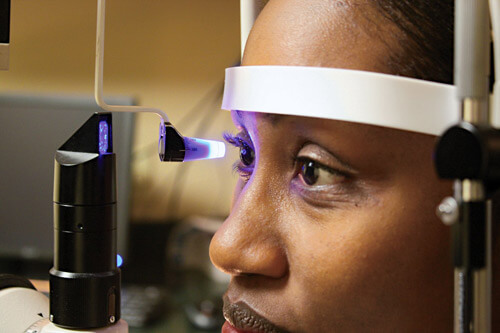(Family Features) Everyone’s vision changes as they age, but some changes could indicate a more serious problem. Age-related macular degeneration and glaucoma are two of the most common eye diseases in older Americans. As many as 11 million people in the United States have some form of macular degeneration, and more than three million have some form of glaucoma, according to the BrightFocus Foundation, a nonprofit organization dedicated to preserving brain and eye health. There may also be an association between untreated poor vision and cognitive impairment, which is another reason to take steps to protect your eyesight.
Age-related Macular Degeneration
Age-related macular degeneration is an irreversible destruction of the central area of the eye’s retina, known as the macula, which leads to loss of the sharp, fine-detail, straight-ahead vision required for activities like reading, driving, recognizing faces, and seeing the world in color. It’s the leading cause of vision loss in Americans 60 years of age and older, and the second highest cause of irreversible blindness in the world.
Glaucoma
Glaucoma is actually a group of eye disorders. They have few symptoms in the early stages, but eventually the optic nerve is damaged, leading to loss of side vision or complete blindness. Glaucoma is a leading cause of blindness among African Americans and Hispanics in the U.S. Between the ages of 45 and 64, glaucoma is 15 times more likely to cause blindness in African Americans than in Caucasians. All people older than 60 are at a greater risk of developing glaucoma than people who are younger.
Best Practices for Healthy Vision
• Eat right to protect your sight, especially fruits and vegetables, and fish high in omega-3 fatty acids such as salmon, tuna, and halibut.
• Exercise daily to improve your immune system and blood pressure and your eye and brain health as well as to maintain a healthy weight.
• Quit smoking. Toxins found in cigarette smoke have been linked to an increased risk for developing macular degeneration.
• Wear high-quality sunglasses with a rating of 99- or 100-percent UV-A and UV-B protection. Also don a wide-brimmed hat when outdoors.
• Have a comprehensive dilated eye exam regularly from an eye doctor.
Eye Tests Everyone Should Have
Regular eye exams are crucial in maintaining eye health and catching any warning signs early. This is particularly important for certain forms of glaucoma, as those affected may not feel or see that anything is wrong until the disease has progressed to stages when vision loss occurs. Comprehensive exams should include these three tests:
• Visual acuity: using an eye chart to test your sight at various distances.
• Pupil dilation: widening the pupil with eye drops, allowing the doctor to see signs of disease.
• Tonometry: tests the fluid pressure inside the eye.
Warning Signs
If you or a loved one experiences any severe or persistent symptoms such as these that can be associated with macular degeneration or glaucoma, contact an eye doctor immediately:
• Loss of vision
• Sudden blurred or hazy vision
• Blind spots or “holes” in your vision
• Shadows over the center of your vision
• Pain in or around the eye that may be accompanied by nausea or vomiting
• Halos around lights at night
• Painful or intense sensitivity to light
• Distortion or waviness of vision, especially central vision
• A loss of side vision or a feeling that you’re looking through a tunnel
BrightFocus Foundation provides free information to the public and advances vital research to end glaucoma, macular degeneration and Alzheimer’s disease. More information about these topics is available at www.BrightFocus.org/See.























